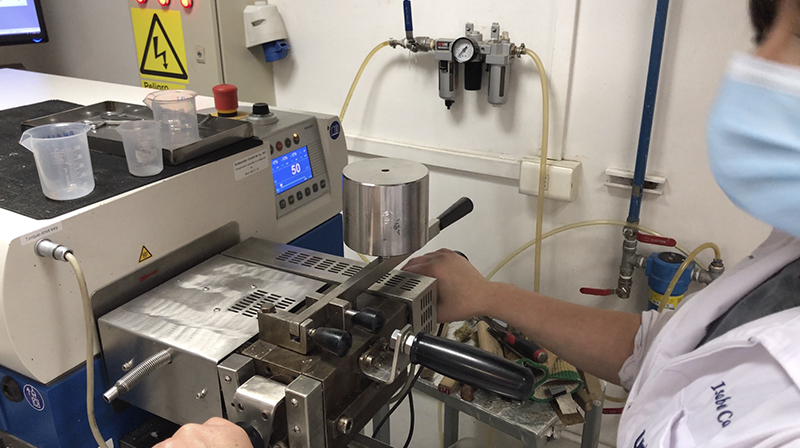Three public funding competitions selected proposals from the Universidad de Concepción, with the aim of supporting the maturation of these technologies and achieving their massification.
Three competitions of the Applied Research Sub-Directorate of the National Agency for Research and Development (ANID), announced their results during the last few days, with initiatives promoted by different academic units of the University of Concepción being selected.
In this regard, the Vice Rector for Research and Development of the UdeC, Dr. Andrea Rodriguez Tastets, stressed that “we want to make visible the projects that have been recently awarded by ANID under different funding instruments”.
“We value”, emphasized the authority, “the effort of all the teams that have prepared projects and we congratulate those who have been awarded in these highly competitive competitions. We highlight the good results in advanced technology, in which UdeC was awarded two of the ten projects selected at national level, exceeding the 10% established by the bases, in the first instance, for the macro zone. And, on the other hand, we recognize a drop in the awarding of Fondef IT for this year and we hope that the feedback from evaluations will allow us to seek improvements to the proposals”.
Thus, in the Health Research and Development Contest, FONIS, the project ‘Design of a climate change adaptation plan for rural sanitation services (SSR) in the Biobío Region, in a public health context’ was selected, led by the academic from the Department of Environmental Engineering, Carolina Baeza Freer, who explained that “our research team recently completed a FONIS project that began in March 2021 that allowed us to work implementing the methodologies of the Water Security Plan (WSP) and Sanitation Security Planning (SSP) in four Rural Sanitation Services (RHS) of the Biobío Region”.
FONIS is a line of financing that seeks to generate and disseminate knowledge through applied scientific and technological research projects that contribute to the resolution of priority problems associated with current sanitation objectives.
In this regard, the researcher from the School of Environmental Sciences explained that “the intensification of the effects of the climate crisis”, the scientist explained, “will aggravate the problems of continuity and quality provided by the Rural Health Services (RHS), whether in the availability of resources, operation, surveillance and impacts on the health of the population served. Several of the dangerous events that are being observed in rural territories will be exacerbated as a consequence of the climate crisis: drought, temperature increase, extreme precipitation events, impact on the availability and quality of water, among others”.
“The FONIS project awarded for this 2023,” he explained, “seeks to obtain a clear diagnosis of the most relevant factors that underpin the implementation of a climate agenda in the SRH to increase resilience and reduce their vulnerability of these services. This applied research project has a public health context, considering the factors that affect communities’ access to safe water and adequate wastewater management.”
The IDeA Advanced Technologies Contest seeks to support the development of applied research and technological development projects that require long cycles in their various stages, and the UdeC projects that were selected in this line are: ‘Sustainable processing of copper concentrates: reductive fusion with green hydrogen from oxidized calcines and copper slags’, Roberto Parra Figueroa, Department of Metallurgical Engineering, Faculty of Engineering:
‘Sustainable processing of copper concentrates: reductive fusion with green hydrogen of oxidized calcines and copper slags’, Roberto Parra Figueroa, Department of Metallurgical Engineering, Faculty of Engineering.
Biofactories of healthy carotenoids: a new alternative based on metabolic engineering in b.subtilis for the sustainable production of safe food ingredients focused on the strengthening of nutritional formulas for enteral feeding’, Jorge Dagnino Leone, Biotechnology Center.
In this regard, the Executive Director of the Transfer and Licensing Office (OTL), Andrea Catalán Lobos, explained that “given the requirements of the competition and the way the funds were awarded, by macro-zone, we carried out an internal pre-selection process, with an evaluation by the OTL, which generated a list of prioritized projects. We held meetings with the teams and supported them in the formulation”.
“We are very pleased with the outcome and congratulate the winning teams. With the feedback sent by ANID, we will work with the projects that were not awarded to prepare them for the next process”, added the director.
While in the Technological Research Competition aimed at associative applied R&D projects that can be converted into new products, processes or services, the UdeC-led initiatives that were awarded are:
- “Molecular traceability of the origin of fecal contamination in bodies of water, for the elaboration of microbiological risk maps, as an input in the development strategies of rural and hard-to-reach communities of the national territory”, Rodrigo González Saldía, Department of Oceanography, Faculty of Natural and Oceanographic Sciences UdeC, associated with the Municipalities of San Pedro de la Paz, Coronel and Tomé.
- “Validation and scaling of a functional food based on microencapsulated peptides with immunostimulant and antimicrobial properties”, Emilio Lamazares Arcia, Department of Physiopathology, Faculty of Biological Sciences UdeC, associated to the companies Salmones Antártica S.A., and Ecombio (Vidal y Urrutia Ltda.).
- “Production and validation of a compostable packaging with active property for the postharvest control of botrytis cinerea during the export of Chilean table grapes”, Juan Carlos Carrasco Prado, UdeC Technological Development Unit, associated to the Instituto de Investigaciones Agropecuarias, and the companies Gesex S.A. and Industria de Materiales de Empaque Ltda.
Source: VRID UdeC

